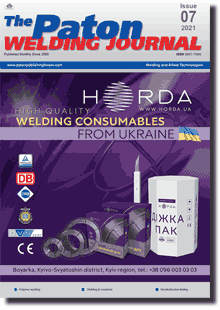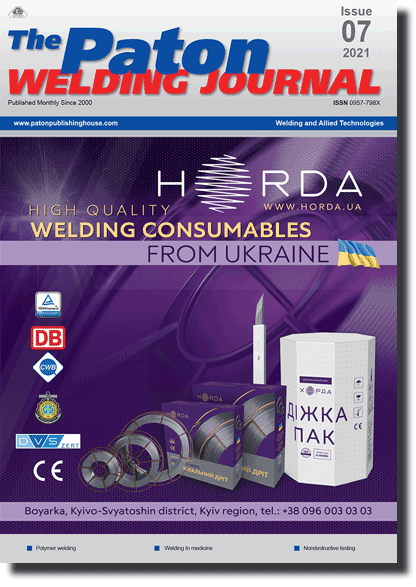| 2021 №07 (02) |
DOI of Article 10.37434/tpwj2021.07.03 |
2021 №07 (04) |

The Paton Welding Journal, 2021, #7, 13-18 pages
Vacuum brazing of kovar–molybdenum dissimilar joints
S.V. Maksymova, P.V. Kovalchuk and V.V. Voronov
E.O. Paton Electric Welding Institute of the NASU. 11 Kazymyr Malevych Str., 03150, Kyiv, Ukraine. E-mail: office@paton.kiev.ua
Abstract
The features of spreading of brazing filler metals of Cu‒Mn‒Co system over molybdenum and Kovar were established based on the performed studies. Micro X-ray spectral analysis determined that zonal crystallization of a brazing filler metal drop on the base metal substrate occurs during spreading: pronounced areas of copper-based solid solution (Cu‒12.92Mn‒4.69Co) form along the outer perimeter of the drop, and dendrites of manganese-based solid solution, characterized by a higher melting point, are crystallized in the drop central part. It has been experimentally proven that an increase in the heating temperature contributes to an increase in the spreading area of the brazing filler metal by improving the spreading of copper-based solid solution. It was found that a copper-based solid solution forms in the brazed seam of dissimilar Kovar‒molybdenum joints, and a molybdenum-based reaction layer (about 1 μm wide), crystallizes at the molybdenum-brazing filler metal interface. This layer is enriched in cobalt (15.80 %) and manganese (14.12 %) and contains a small amount of copper (1.63 %). As a result of mechanical tests of Kovar‒molybdenum overlap joints under static loads at room temperature, destruction occurs partly along the brazed seam and partly along the base metal–molybdenum. 14 Ref., 2 Tables, 6 Figures.
Keywords: Kovar, molybdenum, vacuum brazing, dissimilar joints, copper-manganese-cobalt alloys, microstructure, strength, spreading
Received 26.05.2021
References
1. Tits, T., Wilson, J. (1969) Refractory metals and alloys. Ed. by P.K. Novikova, I.I. Novikov. Moscow, Metallurgiya [in Russian].2. Gurevich, S.M., Nerodenko, M.M., Kharchenko, G.K. et al. (1982) Metallurgy and technology of welding of refractory metals and alloys on their base. Kiev, Naukova Dumka [in Russian].
3. Yermolayev, H.V., Kvasnytskyi, V.V., Kvasnytskyi, V.F. et al. (2015) Brazing of materials: Manual. Ed. by V.F. Khorunov, V.F.,Kvasnytskyi. Mykolaiv, NUK [in Ukrainian].
4. Liu, G.W., Valenza, F., Muolo. M.L. et al. (2010) SiC/SiC and SiC/Kovar joining by Ni-Si and Mo interlayers. J. Mater. Sci., 45, 4299-4307. https://doi.org/10.1007/s10853-010-4337-3
5. Kumar, S., Upadhyay, A., Dinesh Kumar, P., Agarwal, A. (2015) Vacuum brazing of molybdenum-kovar and evaluation of its joint strength. MSF 830-831, 282-285. https://doi.org/10.4028/www.scientific.net/MSF.830-831.282
6. Chen, G., Yin, Q., Guo, C. et al. (2019) Beam deflection effects on the microstructure and defect creation on electron beam welding of molybdenum to Kovar. J. Materials Proc. Technology, 267, 280-288. https://doi.org/10.1016/j.jmatprotec.2018.12.017
7. (1983) Precision alloys: Refer. book. Ed. by B.V. Molotilov. 2nd Ed. Moscow, Metallurgiya [in Russian].
8. Buturlya, E.A., Bugaenko, B.V., Petrenko, L.M., Golub, D.M. (2019) Features of active brazing of ceramics with metals. Visnyk DDMA, 1(45), 38-42 [in Ukrainian].
9. (1997) State diagrams of binary metal systems: Refer. book. Ed. by N.P. Lyakishev. In: 3 Vol., Vol. 2. Moscow, Mashinostroenie [in Russian].
10. Chen, G., Yin, Q., Dong, Z. et al. (2020) Microstructure evolution analysis for the reaction interface between molybdenum and Kovar acquired by electron beam welding-brazing. Materials Characterization, 171. https://doi.org/10.1016/j.matchar.2020.110781
11. Favstov, Yu.K., Shulga, Yu.N., Rakhshtadt, A.G. (1980) Metals science of high-damping alloys. Moscow, Metallurgiya [in Russian].
12. Krasovskyi, V.P., Gab, I.I., Stetsyuk, T.V., Krasovska, N.O. (2017) Wetting of quartz glass by low-melting brazing melts. Adgeziya Rasplavov i Pajka Materialov, 50, 18-27 [in Russian].
13. Drits, M.E. (1979) Binary and multicomponent copper-based systems: Refer. book. Moscow, Nauka [in Russian].
14. Maksymova, S.V., Kovalchuk, P.V., Voronov, V.V. (2019) Influence of cobalt on structure and technological properties of Cu-Mn system alloys. Metalofiz. Novitni Tekhnologii, 41(10), 1365-135. https://doi.org/10.15407/mfint.41.10.1365
Suggested Citation
S.V. Maksymova, P.V. Kovalchuk and V.V. Voronov (2021) Vacuum brazing of kovar–molybdenum dissimilar joints. The Paton Welding J., 07, 13-18.The cost of subscription/purchase order journals or individual articles
| Journal/Currency | Annual Set | 1 issue printed |
1 issue |
one article |
| TPWJ/USD | 384 $ | 32 $ | 26 $ | 13 $ |
| TPWJ/EUR | 348 € | 29 € | 24 € | 12 € |
| TPWJ/UAH | 7200 UAH | 600 UAH | 600 UAH | 280 UAH |
| AS/UAH | 1800 UAH | 300 UAH | 300 UAH | 150 UAH |
| AS/USD | 192 $ | 32 $ | 26 $ | 13 $ |
| AS/EUR | 180 € | 30 € | 25 € | 12 € |
| SEM/UAH | 1200 UAH | 300 UAH | 300 UAH | 150 UAH |
| SEM/USD | 128 $ | 32 $ | 26 $ | 13 $ |
| SEM/EUR | 120 € | 30 € | 25 € | 12 € |
| TDNK/UAH | 1200 UAH | 300 UAH | 300 UAH | 150 UAH |
| TDNK/USD | 128 $ | 32 $ | 26 $ | 13 $ |
| TDNK/EUR | 120 € | 30 € | 25 € | 15 € |
AS = «Automatic Welding» - 6 issues per year;
TPWJ = «PATON WELDING JOURNAL» - 12 issues per year;
SEM = «Electrometallurgy Today» - 4 issues per year;
TDNK = «Technical Diagnostics and Non-Destructive Testing» - 4 issues per year.


